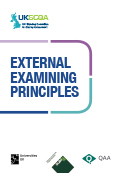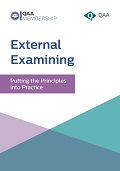The external examining system has been a key mechanism for upholding academic standards in UK higher education for almost 200 years, ensuring comparability across different institutions. Within a system where autonomous institutions develop their own curricula, the UK higher education sector enables a vast range of courses to be offered which are linked to institutional research specialisms, local and industry needs, and student demand.
External examiners perform an essential function in supporting this diversity of subjects, acting as constructively critical peers. For example, they support course teams to ensure that students are assessed fairly and transparently by offering independent advice and support on modes of assessment and learning outcomes.



